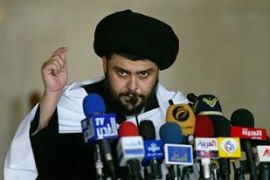Mahdi Army ‘obeys’ truce order
Militia fighters say they could resume violence if provoked by US troops.

“We say to the Americans, don’t be happy. The resistance does not end,” Shaibani said.
‘Wait and see’
The Pentagon cautiously welcomed the six-month truce.
“The proof of Muqtada al-Sadr’s sincerity is in the pudding,” Brigadier General Richard Sherlock, deputy director for operational planning at the US department of defence, said.
| In video | ||
|
Who is Muqtada al-Sadr? |
“We have to wait and see. We need to see actions that correspond to that as opposed to just calls for calm.”
The US military has welcomed an order given by Muqtada al-Sadr, the Iraqi Shia leader, to freeze his militia’s activities following deadly clashes in southern Iraq.
Hazim al-Araji, an aide to al-Sadr, read a statement from the Shia leader saying “we declare the freezing of Mahdi Army without exception in order to rehabilitate it in a way that will safeguard its ideological image within a maximum period of six months starting from the day this statement is issued.”
Corrupt leaders
Abu Ali, another Mahdi Army commander in Sadr City, said the suspension order would expose corrupt leaders.
| “There are some bad leaders in the Mahdi army who should have been replaced a long time ago” Abu Ali, Mahdi Army commander |
“There are some bad leaders in the Mahdi Army who should have been replaced a long time ago … Through this order the corrupt elements will show their faces, because they will not comply,” he said.
US forces have previously said that many attacks against them and Iraqi security forces are the work of “rogue” Mahdi Army groups, who may not operate under al-Sadr’s full control.
Analysts said al-Sadr’s six-month order would be a test of his authority over the group, which is believed to have fragmented and, according to the US, has received funding, training and weapons from Iran.
